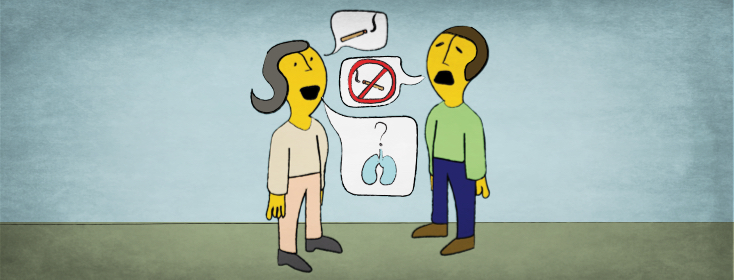Your Voice Matters
Share Your Story, Break the Stigma
Lung cancer carries with it the connotation that the patient brought it upon his or herself. Virtually the first question many of us hear upon revealing our diagnosis is some version of "did you smoke?" While the question may be one of legitimate curiosity, it still reveals the prevailing belief that lung cancer is a disease that is due to the patient's own behavior. The broader ramifications for this include social marginalization and historically less vigorous research funding than the comparatively high number of fatalities would generally suggest. In spite of strong advances in treatment options and a much greater scientific understanding of the numerous cancers afflicting the lungs, lung cancer has not seen an influx in funding comparable to other cancers with greater awareness, nor has it seen the shift in its narrative that it desperately needs.
Part of this is your fault.
As a cancer patient or caregiver, you -- we -- must all be willing to speak out. The victim shaming so often associated with sharing a lung cancer diagnosis can only be fought by revealing the greater truths underlying the disease. If our stories are not shared, the broad understanding of what lung cancer is, how it is treated, and what living with lung cancer is like, will never change. Newly diagnosed patients will still squirm with the same old fears, insecurities, and the nagging thought that they brought it upon themselves.
No One Deserves Lung Cancer or Its Stigma
I have never met a lung cancer patient who asked for the disease. I have never met a lung cancer patient who deserved the disease. And while smoking certainly is a huge contributing factor for many patients, it is far from the only contributing factor. Considering the long issues of legality and availability of tobacco (not to mention the aggressive disinformation campaigns about its ramifications to a smoker's health and the decades of concerted marketing to make tobacco use appear desirable), for many smokers it was already too late when they were educated enough to even consider quitting, addiction or not. Besides, what about radon gas? What about asbestos? What about just living next to a busy freeway? There are many questions that a curious person could ask when a patient reveals a lung cancer diagnosis, but our cultural understanding of it still pushes the smoking narrative and its associated victim-blaming to the front of the question queue.
I have even had this response: "I didn't know you were a smoker!" Answer: "I am not a smoker." Follow up question: "Then how did you get lung cancer?" Answer: "Nobody really knows." You see, my story is that I have no genetic history and no known risk factors to pull hypothetical causes from. And even if I did, there is little way to know with certainty what the ultimate cause of a patient's lung cancer truly is. It turns out that the range of cancers of the lung is far more complex than the common narrative suggests. And this is why we need more research funding, more innovative approaches to treatment and early diagnosis, more compassion for patients, and better education about improved outcomes through modern treatments. Until the narrative changes, all these things will lag.
Let's Change the Narrative Together
In the last few years, there has been a rise in personal blogs from lung cancer patients and advocates. This is an important trend, as is the increase in websites as virtual support networks. Not every patient is an active writer or will feel comfortable as a public figure (and trust me, we still have to deal with trolls and naysayers, even when revealing a deeply personal story, especially when it confronts entrenched fears or bias), but we should all learn to raise our voices in our own way. Just as every lung cancer is unique, every patient has a unique story to tell; every caregiver has a unique perspective to share; everyone touched by a diagnosis has a contribution to make to the greater understanding of what "lung cancer" means.
Together, voices raised, the narrative will change. And with it, so will the future of research and treatment.1-4
Editor's Note: We are extremely saddened to say that on October 21, 2018, Jeffrey Poehlmann passed away. Jeffrey’s advocacy efforts and writing continue to reach many. He will be deeply missed.

Join the conversation